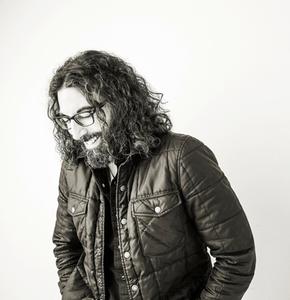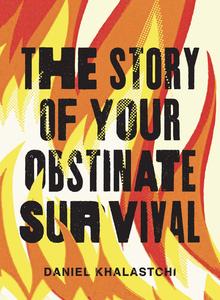
|
|
| photo: Barry Phipps | |
Daniel Khalastchi is an Iraqi Jewish American. A graduate of the Iowa Writers' Workshop and a former fellow at the Fine Arts Work Center in Provincetown, he is the author of four books of poetry--most recently The Story of Your Obstinate Survival (University of Wisconsin Press, March 12, 2024), which collapses genre and upends narrative convention with dazzling wordplay and thrilling imagery. Khalastchi lives in Iowa City, where he directs the University of Iowa's Magid Center for Writing. He is also the cofounder and managing editor of Rescue Press.
On your nightstand now:
My nightstand is narrow and has no drawers. There's just enough room for a lamp and a pile of books, which means it holds everything I need. At the top of the pile are my two current and favorite reads of the year--Nam Le's 36 Ways of Writing a Vietnamese Poem and Benjamín Labatut's When We Cease to Understand the World (both of which are stunning in a way that could itself be the subject of this entire q&a). Beneath them are the following: The Sun Also Rises by Ernest Hemingway (which my wife received as a gift after graduating law school, and which I promptly pilfered); Tyrant by Stephen Greenblatt (which I need to return to its owner--sorry Jim!), Pedro Páramo by Juan Rulfo (I hope people are still reading this book); Ghost Worlds by Melba Goodwyn (bookmarked at a chapter entitled "Hauntings, Past and Present"), The Candy House by Jennifer Egan; and The Truth About the Sun by Jamie Cooper (which ends--spoiler alert--with a killer poem and these words: "You are the commander of many storms. Inside, you drag the demon out into the light"). Under all these books, there's a Moleskine-like notebook with some musings on James Merrill and then, below that and resting flat against the top of the nightstand, is a disposable hand towel, folded in thirds and monogrammed with the names of my grandparents--Shirlee and Jim Marcovis--which I took when cleaning out their house last year after their passing. Apparently, even now, they are reminding me to read, think, and also to keep tidy.
Your top five authors:
There's just no way to narrow it down, but I can give you five authors who have recently blown me away: Jonathan Escoffery (If I Survive You absolutely captivated me from start to finish), Jane Huffman (everyone: go read Public Abstract), Madeline McDonnell (whose debut novel, Lonesome Ballroom, we are putting out via Rescue Press next fall, and which I've been rereading/editing this month), Timmy Straw (their debut collection of poems, The Thomas Salto, is a full-on knockout), and Chris Stuck (Give My Love to the Savages should be required reading).
 Book you're an evangelist for:
Book you're an evangelist for:
There are a lot of books I evangelize. Recently, anyone who has asked for a book recommendation from me has likely gotten a slightly overstimulated, breathlessly enthusiastic suggestion to purchase (ideally from Prairie Lights Books in Iowa City) Damnation Spring by Ash Davidson and/or All This Could Be Different by Sarah Thankam Mathews. These novels dropped me sideways and left me looking at the world from new angles. But if you're asking what's the book I think every human in the world should read (and if we're jumping over Jesus' Son by Denis Johnson because we are assuming everyone else in this series has also mentioned it), then you'll have to be patient as I speak at length about The Collected Stories by Leonard Michaels. From the first line in the first story ("Manikin") to the closing of its last (the masterful "Cryptology"), every single part of every single sentence on every single page that make up this 403-page masterpiece is, well, perfect. I know. It sounds hyperbolic, but I guess read it and tell me if I'm wrong. I'll wait.
Book you've bought for the cover:
In Israel this past summer--during an intense heatwave--my wife and I stumbled into an artists print and bookshop that was fabulously curated. Maybe it was the wandering-in-the-desert-ness of the day, or maybe it was the cool hum of the air-conditioning guiding us to the back of the store, but for whatever reason we both gravitated toward a beautiful, clothbound hardcover Passover Haggadah. The cover's generic white background is quickly flooded by wood-cut images of pyramids and mountains awash in a sandstone palette--corals and sea blues, greens and mustard yellows--and its elegant details (heads of flowers, the outline of vases, the moon and sun) spark to life and shimmer in delicate gold foil. The title itself (all in Hebrew) is debossed and foiled, and holding it now, in this Midwestern March afternoon sunlight on the couch in my living room, its elements are so striking it appears as if the cover itself is animated--somehow in a state of motion even though it's still, the gold foil pulsing like fish in a river. I have long been drawn to Haggadot and their translations, but I certainly wasn't looking for one that day. The book now lives on our coffee table to the right of our front door. It will be with us forever.
Book that changed your life:
When I was in high school, I liked to announce myself as a poet, mostly because I listened to a lot of Dylan and Springsteen and the Velvet Underground but knew I didn't have the guts to call myself a musician. I loved language and the way that words, when placed together in a specific sequence, could unfold an emotion inside its audience like nothing else could. I wrote a lot and mimicked what I heard in songs I loved, and eventually, because I had taken all the creative writing classes my high school had to offer, I was given the chance to enroll in a college-level poetry class at Drake University. In a small, stuffy, oddly configured classroom, I opened our class textbook on a mid-January early evening and began, for the first time, to encounter the writers, voices, and artistic inventiveness that would go on to shape (to make this sound dramatic) the rest of my life. The book was an anthology called Contemporary American Poetry, edited by A. Poulin Jr. Imagine coming across all these writers at one time: Gwendolyn Brooks, Rita Dove, Louise Glück, Robert Hass, Richard Hugo, Donald Justice, Philip Levine, James Merrill, W.S. Merwin, Mark Strand, to name a few. My mind was eviscerated--in the best way. I know, without a doubt, I would not be answering these interview questions right now if that book hadn't found its way into my hands.
Favorite line from a book:
"You think God doesn't have a tractor?" --James Galvin, "Show-and-Tell" from X

